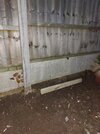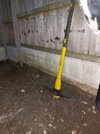- Joined
- 30 Jan 2020
- Messages
- 26
- Reaction score
- 1
- Country

I had decided to remove raised flower bed in my garden, as the wooden supporting edge deteriorated. However I haven't realised that the fence base panels weren't put deep enough, so now if I make the soil level with the rest of the garden, there is exposed soil. And I fear it might deteriorate slowly.


So I think it needs supporting, but I'm struggling to figure the best approach. I want to put just a turf on the ground (or artificial grass).
Currently I could thing of following
1. put some rocks in there and make it look a little like rock garden
2. put a sleepers there
3. dig under the panels and lower them a little, making the fence a little lower though
4. put back some soil and put the turf on slope
5. leaving it untouched
But there might be some better solution? Any ideas?
Thanks


So I think it needs supporting, but I'm struggling to figure the best approach. I want to put just a turf on the ground (or artificial grass).
Currently I could thing of following
1. put some rocks in there and make it look a little like rock garden
2. put a sleepers there
3. dig under the panels and lower them a little, making the fence a little lower though
4. put back some soil and put the turf on slope
5. leaving it untouched
But there might be some better solution? Any ideas?
Thanks
